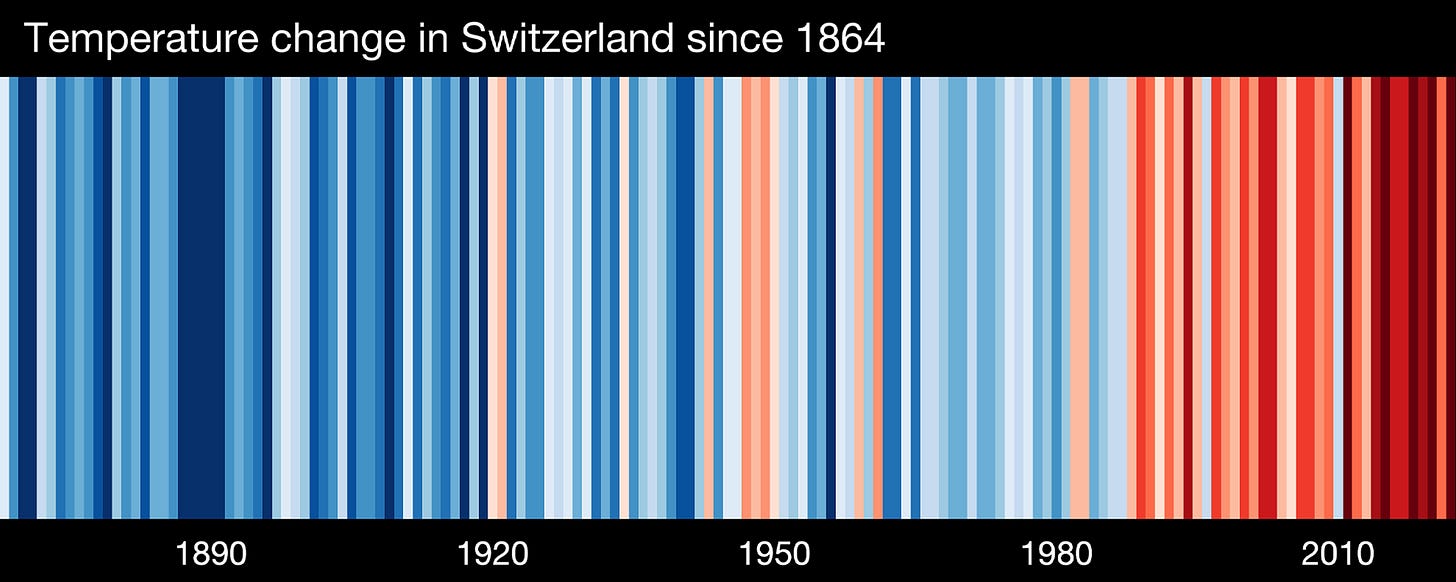Switzerland and climate change
A new climate bill, rapid warming, and actions that inspire
Climate change is all around us these days. Last month, we saw the hottest June on record. Last week, we may have experienced the hottest day in 125,000 years. Wherever we live, we are seeing the impacts of climate change affect the people, the places, and the things we love. I spent last week in Switzerland where I saw first-hand how climate change is affecting people's lives and the land. I also heard the good news about their brand-new net zero bill, and learned of many inspiring people and programs who are encouraging everyone, from children to seniors, to act. My talk at ETH Zurich was recorded so you can watch it if you want, too. Please check out this edition of my newsletter for all the details -- and don't forget to share and subscribe!
GOOD NEWS
In June, Swiss voters approved a new climate bill to cut fossil fuel use and reach net-zero emissions by 2050. Despite a well-funded opposition that spread false information on the costs and impacts of a clean energy transition, 59 percent of Swiss voters said yes.
This bill was strongly supported by many climate scientists, including my colleague Reto Knutti at ETH Zurich. In April, he wrote this essay explaining why he and other scientists were advocating for the legislation, and how the new Climate Protection Law would make Switzerland stronger.
The bill commits the country to carbon neutrality by 2050 and provides financial support — about $3 billion Swiss francs — to help homeowners and businesses invest in climate-friendly energy alternatives. It also aims to cut imported fossil fuels in favor of Swiss-made renewables.
This victory is especially encouraging because it indicates a turning point in Swiss public opinion on climate change. Just two years ago, voters rejected an attempt to curb greenhouse gases. Political observers attribute the change to growing awareness of climate impacts, including the loss of a third of the country’s glaciers over the last two decades, and concerns about energy security in the wake of Russia’s invasion of Ukraine.
NOT-SO-GOOD NEWS
The country of Switzerland is warming 2 to 3 times faster than the global average. Summers are getting warmer, drier, and longer, with more extreme heat days and heatwaves. The freezing line is moving up the mountains, and although winter precipitation is increasing, much more of it is falling as rain and less as snow, according to MeteoSwiss.
Not only are temperatures increasing – last year being the warmest year on record for Switzerland and many other European countries – but warmer conditions are melting increasing amounts of snow and ice as well. “2022 was a disastrous year for Swiss glaciers: all ice melt records were smashed by the great dearth of snow in winter and continuous heat waves in summer,” the Swiss Academy of Sciences said.
Most of the Alps remained bare of snow well into January this year, and mountain glaciers are melting at an alarming rate. Last year, they lost more than 6 percent of their volume, which dismayed glaciologists who say a loss of 2 percent would once have been considered extreme. About 5 percent of the country is permafrost (permanently frozen ground); but that is thawing as well, putting mountain climbers, buildings, and even entire towns at risk from unstable ground and rockfalls.
These changes are affecting everything: from tourism and water supply, to the country’s unique species and ecosystems. Forests are struggling with heat stress, pests, and disease, while native alpine plant species are being pushed up the mountain by warming conditions—but there’s only so far they can go. As is the case nearly everywhere we live, climate change is transforming Switzerland's unique landscapes and affecting the lives of all who call it home.
WHAT YOU CAN DO
In Switzerland, I saw many examples of people who are taking action in ways that you can, too.
I’ve previously mentioned how over 2,000 older Swiss women are taking the country to the European Court of Human Rights because climate impacts, particularly extreme heat, disproportionately affect elderly people and women. Above, I shared above how scientists like Reto and his colleagues are stepping up and calling for climate policy and legislation for climate action. I also heard from many employees of financial institutions, companies and start-ups who are using their voices to advocate for climate action within their organizations.
In terms of personal action, in Switzerland there are options like bank accounts that plant a tree every time you spend 100 CHF, advise you on sustainable investments, or allow you to support youth climate initiatives; Klimaschule programs that engage students in sustainability and climate action; climate food initiatives that help people plan low-carbon meals and invite their friends and neighbours to participate; Swiss Climate Action that “engages people from all walks of life to identify and implement the climate solutions that will be effective in Switzerland”; and Citizen’s Climate Lobby chapters that help people work together to get good climate laws passed.
This week, use these examples to spur some new ideas about how you could use your voice to call for action, or take a look at what citizen climate action programs are available in your city, state, province, or region that you could support or join. You might be surprised!




